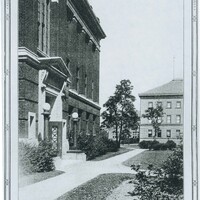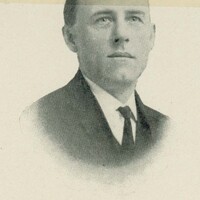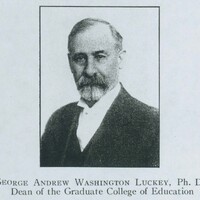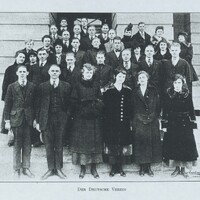Disloyalty Trial at the University of Nebraska
Brett Michelson, sponsored by UCARE
Overview and Law Building
At the beginning of World War I (1918) the University of Nebraska held a trial against members of the university community, including professors. During the trial many individuals were accused of being "disloyal" and unpatriotic.
Professor Persinger of the History Department and Professor G.W.A. Luckey of the Education Department were put on trial with other professors, who came from different academic disciplines. Professor Persinger and Luckey were considered differently from the rest of those accused as they chose to talk to the press.
Conducted by a Council of Defence, the trial took place in the Law Building from May 28- June 12, 1918. Most of the evidence provided remained unsubstantiated. Many of those who served as witnesses were faculty members that had overheard negative comments made about the United States.
During the trial additional accusations were made, some towards faculty from the German and English Departments. Even though they were added to the list of people accused, many were let go with no actions taken against them.
At the end of the trial the Board of Regents ruled that there was no disloyalty. However, both Professor Persinger and Luckey were asked for their resignations because they had involved themselves and the University in public criticism.
C.E. Persinger and G.W.A. Luckey
Professor C.E. Persinger, a History Professor at the University, was one of the accused in the disloyalty trial. Persinger was very outspoken about his views of the war as shown in his writings published in several Lincoln and Omaha newspapers. He and Professor Minnie Throop England had disagreements that were published in the "Letters to the Editor" sections. His views were best expressed in a quote from Manley's Centennial History of the University of Nebraska: "the present use of the university for purposes of war propaganda, particularly for such affairs as the grandstanding war convocation" was disgraceful to the University." Persinger did not hide his opinions that the U.S. should not be involved in WWI. However, he showed his patriotism through purchasing many war bonds and doing things to help the forces overseas.
Professor C.E. Persinger is discussed in many books, briefly, because of his status simply as a professor. His writings primarily criticized the ideals that led to U.S. involvement in the war rather than the President and his decisions.
G.W.A. Luckey, an Education Professor thought to be speaking out against the war and the Presidents policies, had poorly documented evidence held against him. Despite this, the University still asked him to resign. Many who accused him pointed to his speeches and how he conducted himself around pro-war rallies. Once speech specifically identified, Luckey made in Howells, Nebraska: "I do not want to fight and die in the trenches of a foreign land in a war that is not of my making and not my war." This comment made him a prime target in the university trial.
Many students found the courage to stand up for Professor Luckey and tell the Council of Defense that he was a good man. Chancellor Avery and the Defense Council got several letters defending Luckey and showing how he was not disloyal to the University or the U.S. Even though many of his students tried to back him Luckey was still let go at the end of the trial.
Professors Accused
Robert Manley's Centennial History of the University (1969) includes information on those who were initially accused and results of the trial.
Initially accused:
- L.E. Alysworth, professor of Political Science
- Henry Blumberg, professor of Mathematics
- H.W. Caldwell, professor of American History
- Annis Chaikin, secretary of the Nebraska Alumni Association
- Mary Fossler, assistant professor of Chemistry
- Paul H. Grummann, head of the School of Arts
- E.L. Hinman, professor of Philosophy
- Erwin P. Hopt, professor of Agronomy
- G.W.A. Luckey, professor of Education
- Clark E. Persinger, professor of American History
- A.S. Riddervolt, assistant professor of civil Engineering
- John P. Senning, instructor of Political Science
- Addison Sheldon, professor of American History
- Louis B. Tuckerman, professor of Physics
- Harry K. Wolfe, professor of Philosophy
Results following the "disloyalty trials" on June 19, 1918:
Three faculty members were asked for their resignation:
- Erwin P. Hopt
- G.W.A Luckey
- C.E. Persinger
Other faculty were exonerated as they were perceived to only late to support the war cause:
- L.E. Aylsworth
- Henry Blumberg
- H.W. Caldwell
- Annis Chaikin
- Mary Fossler
- Paul H. Grummann
- E.L. Hinman
- John P. Senning
- Addison E. Sheldon
- Louis B. Tuckerman
- Harry K Wolfe
A decision relating to one faculty member remained pending:
- A.S. Riddervolt
(Manley, Centennial History of the University, v1, pg. 223-224)
Student German Club
At the Univesity students were still able to get together and learn German despite the loyalty trial. No student was ever put on trial for possible disloyalty. This proved an interesting point as students participated in activites that the Board of Regents tried to move away from during the war. This German Club stood out because the students would get together and talk German and try and learn the language with one another. They wanted to learn the language so that they could talk to Germans and learn from them despite the United States involvement in the war.
Wartime
To fully understand what was going on during this time, I decided to look back at other wars and see if these same types of attacks had happened to people before. In almost every major war conflict in our history someone or some group of people were persecuted for what they thought. It was interesting that this even went back to the civil war with some newspapers taking the heat for publishing criticisms of Lincoln. The book, Perilous Times: Free Speech in Wartime by Geoffrey R. Stone, was a great book for my research.
I have always wondered why we seem to hate those people who talk freely when we as a nation believe in free speech. Throughout my research of the trial here at UNL this has been the issue that always seems to creep back up. Professor Luckey was a great teacher but as soon as he was heard saying one negative thing about WWI he was immediately prosecuted.
Students were also feeling the pressures of wartime. Many young men left school to join the service, this allowed young women to join the University, which was a great thing. At the same time with so many people leaving the University I feel like it put more pressure on the teachers and especially Chancellor Samuel Avery. With him being in Washington for much of the UNL loyalty trial, it was hard for him to know what exactly was going on and by the time he got back he had no choice but to let Luckey and Persinger go. As stated before they were not fired for being disloyal they were fired for putting the University under scrutiny.




